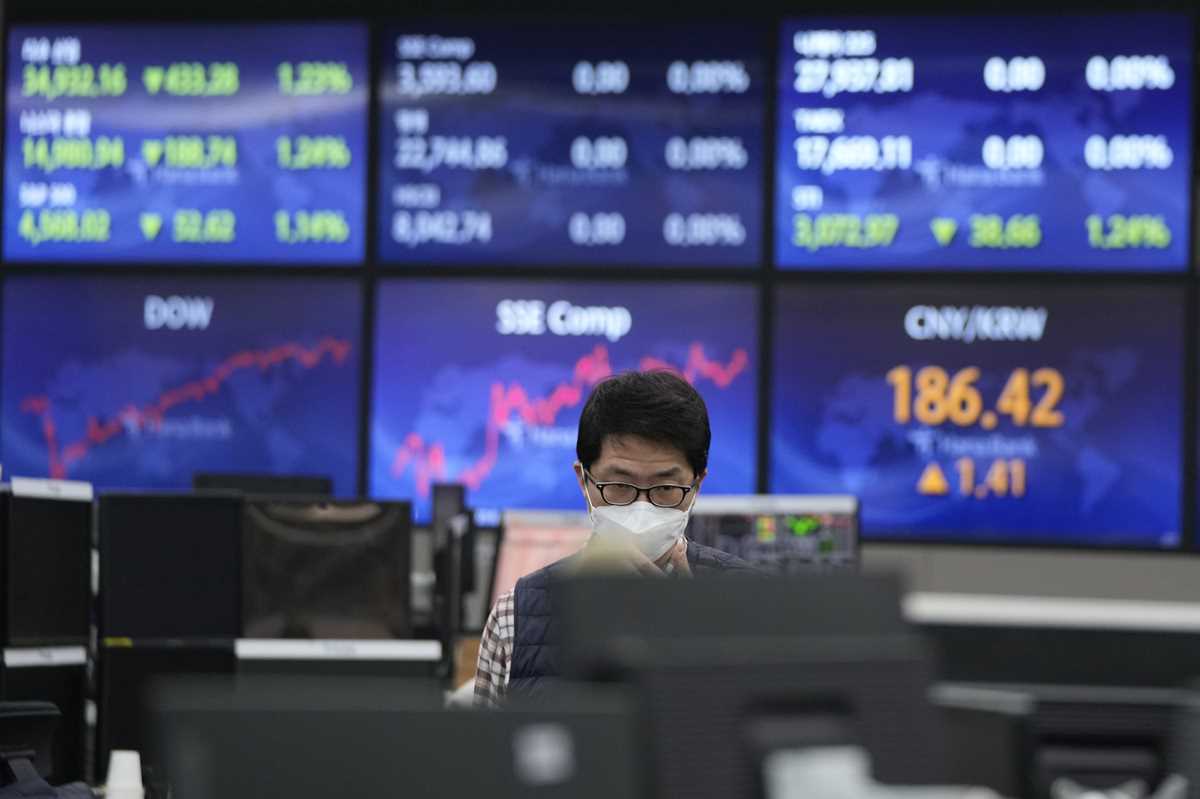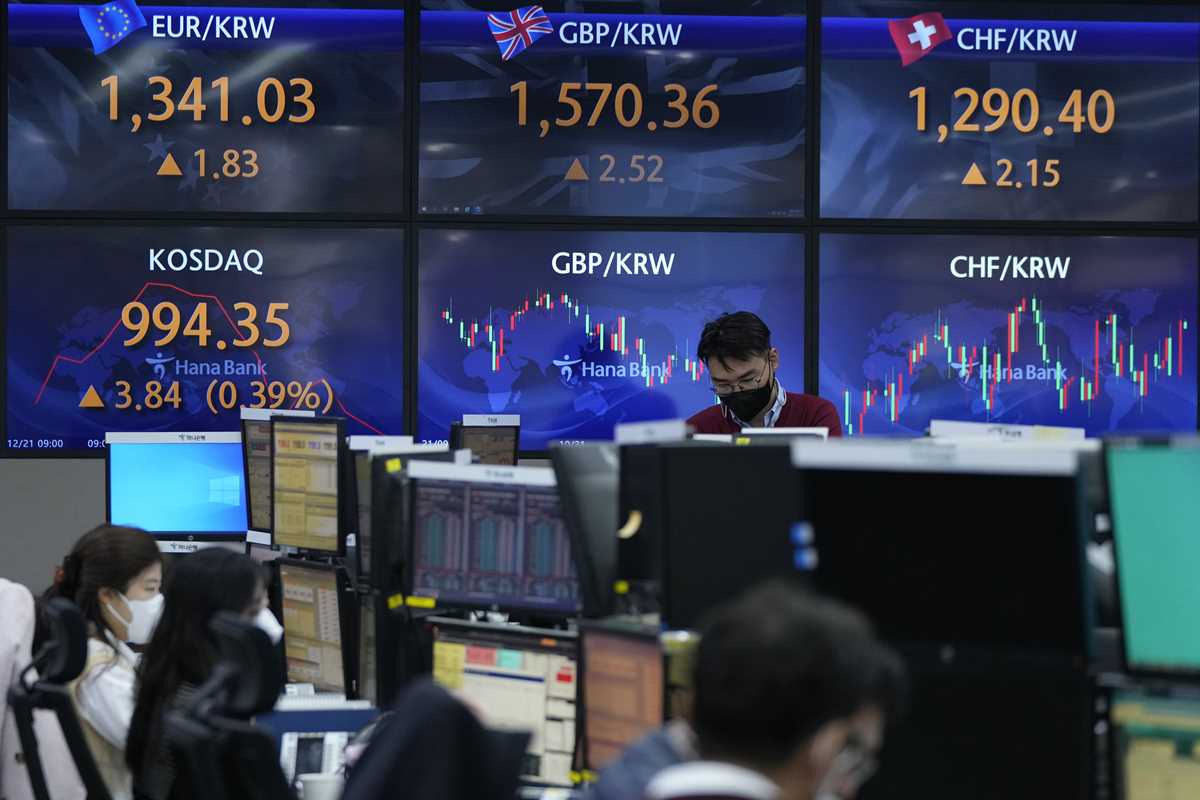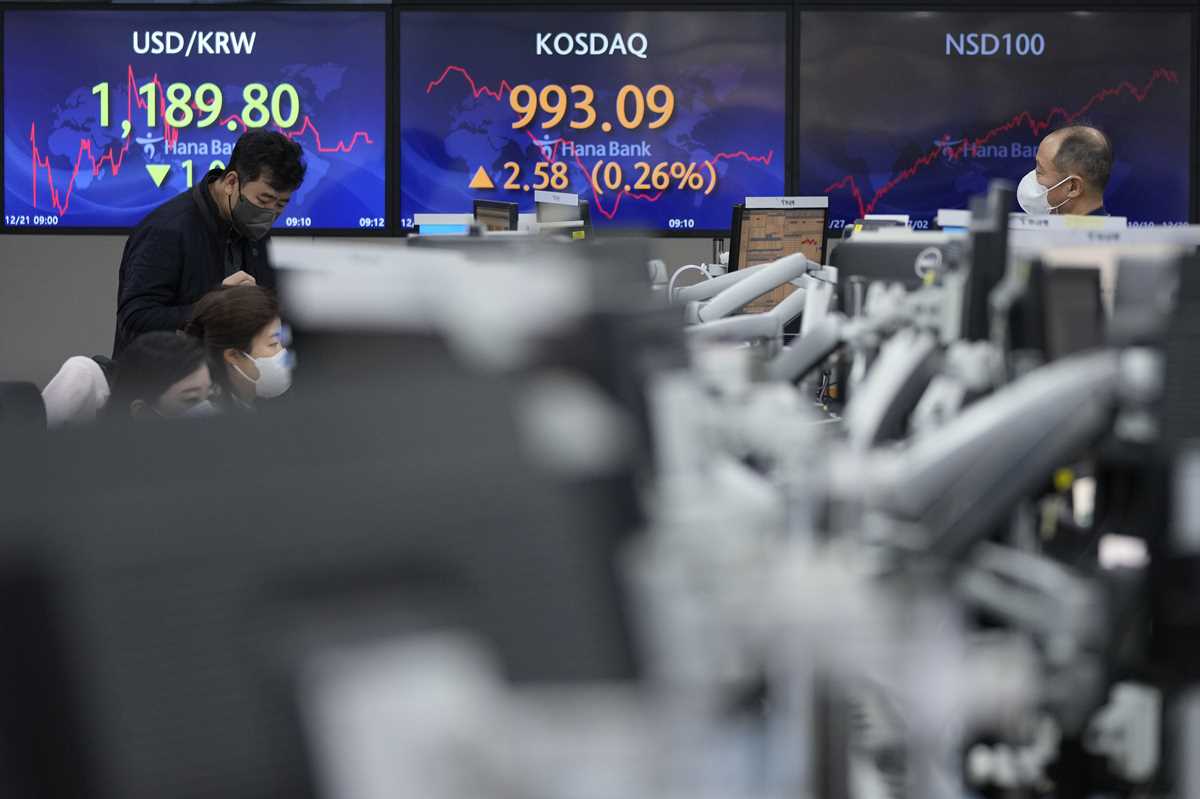 A Wall Street sign is seen next to surveillance equipment outside the New York Stock Exchange, Oct. 5, 2021, in New York. Stocks are falling in early trading Monday, Dec. 20, 2021 continuing a weak stretch as traders keep a wary eye on global increases in COVID-19 cases. Traders also got news over the weekend that a key U.S. senator wouldn't support President Joe Biden's $2 trillion domestic spending bill, putting its passage in doubt. (AP Photo/Mary Altaffer, file)
A Wall Street sign is seen next to surveillance equipment outside the New York Stock Exchange, Oct. 5, 2021, in New York. Stocks are falling in early trading Monday, Dec. 20, 2021 continuing a weak stretch as traders keep a wary eye on global increases in COVID-19 cases. Traders also got news over the weekend that a key U.S. senator wouldn't support President Joe Biden's $2 trillion domestic spending bill, putting its passage in doubt. (AP Photo/Mary Altaffer, file) A currency trader watches monitors at the foreign exchange dealing room of the KEB Hana Bank headquarters in Seoul, South Korea, Tuesday, Dec. 21, 2021. Asian shares were mostly higher on Tuesday after a worldwide slump for financial markets spurred by worries about how badly the omicron variant, inflation and other forces will hit the world economy. (AP Photo/Ahn Young-joon)
A currency trader watches monitors at the foreign exchange dealing room of the KEB Hana Bank headquarters in Seoul, South Korea, Tuesday, Dec. 21, 2021. Asian shares were mostly higher on Tuesday after a worldwide slump for financial markets spurred by worries about how badly the omicron variant, inflation and other forces will hit the world economy. (AP Photo/Ahn Young-joon) A currency trader watches monitors at the foreign exchange dealing room of the KEB Hana Bank headquarters in Seoul, South Korea, Tuesday, Dec. 21, 2021. Asian shares were mostly higher on Tuesday after a worldwide slump for financial markets spurred by worries about how badly the omicron variant, inflation and other forces will hit the world economy. (AP Photo/Ahn Young-joon)
A currency trader watches monitors at the foreign exchange dealing room of the KEB Hana Bank headquarters in Seoul, South Korea, Tuesday, Dec. 21, 2021. Asian shares were mostly higher on Tuesday after a worldwide slump for financial markets spurred by worries about how badly the omicron variant, inflation and other forces will hit the world economy. (AP Photo/Ahn Young-joon) Currency traders work at the foreign exchange dealing room of the KEB Hana Bank headquarters in Seoul, South Korea, Tuesday, Dec. 21, 2021. Asian shares were mostly higher on Tuesday after a worldwide slump for financial markets spurred by worries about how badly the omicron variant, inflation and other forces will hit the world economy. (AP Photo/Ahn Young-joon)
Currency traders work at the foreign exchange dealing room of the KEB Hana Bank headquarters in Seoul, South Korea, Tuesday, Dec. 21, 2021. Asian shares were mostly higher on Tuesday after a worldwide slump for financial markets spurred by worries about how badly the omicron variant, inflation and other forces will hit the world economy. (AP Photo/Ahn Young-joon) Currency traders watch monitors at the foreign exchange dealing room of the KEB Hana Bank headquarters in Seoul, South Korea, Tuesday, Dec. 21, 2021. Asian shares were mostly higher on Tuesday after a worldwide slump for financial markets spurred by worries about how badly the omicron variant, inflation and other forces will hit the world economy. (AP Photo/Ahn Young-joon)
Currency traders watch monitors at the foreign exchange dealing room of the KEB Hana Bank headquarters in Seoul, South Korea, Tuesday, Dec. 21, 2021. Asian shares were mostly higher on Tuesday after a worldwide slump for financial markets spurred by worries about how badly the omicron variant, inflation and other forces will hit the world economy. (AP Photo/Ahn Young-joon)BANGKOK (AP) — Asian shares bounced back Tuesday from a worldwide slump in financial markets spurred by worries about how badly the omicron variant, inflation and other forces will hit the world economy.
Tokyo gained more than 2% and other benchmarks in Asia also were higher.
Much of the concern over the global outlook has been driven by the omicron variant of coronavirus. Cases have skyrocketed in Europe and in the U.S., where federal health officials announced it accounted for 73% of new infections last week, a nearly six-fold increase in only seven days.
In Asia, cases of coronavirus have surged in Australia and South Korea, as governments tighten precautions to prevent or curb outbreaks. But bargain-seeking traders have often opted to buy when prices fall, adding to the volatility that is common during the thin activity of the holiday season.
Tokyo's Nikkei 225 index rose 2.1% to 28,517.59 and the Hang Seng in Hong Kong added 1.2% to 23,024.78. In Seoul, the Kospi gained 0.4% to 2,975.03, while the Shanghai Composite index picked up 0.9% to 3,626.48. In Sydney, the S&P/ASX 200 climbed 0.9% to 7,355.00.
Monday's sharp declines were “enough to sucker the fast-money FOMO gnomes in Asia into action," Jeffrey Halley of Oanda said in a commentary.
Shares fell around the world on Monday. Stocks of oil producers helped lead the way lower after the price of U.S. crude fell 3.7% on concerns the newest coronanvirus variant could lead factories, airplanes and drivers to burn less fuel.
Oil prices also rebounded Tuesday, with the U.S. benchmark gaining 85 cents to $69.46 per barrel in electronic trading on the New York Mercantile Exchange. Brent crude, the international standard for pricing, rose 64 cents to $72.16 per barrel.
Omicron may be the scariest force hitting markets, but it’s not the only one. A proposed $2 trillion spending program by the U.S. government took a potential death blow over the weekend when an influential senator said he could not support it. Markets are also still absorbing last week's momentous move by the Federal Reserve to more quickly remove the aid it's throwing at the economy, because of rising inflation.
They all combined to drag the benchmark S&P 500 1.1% lower to 4,568.02. The Dow Jones Industrial Average fell 1.2%, to 34,932.16. The Nasdaq composite fell 1.2%, to 14,980.94.
Smaller company stocks fared worse than the rest of the market. The Russell 2000 index fell 1.6%, to 2,139.87.
Thailand is mulling tighter precautions after just recently loosening stringent quarantine rules to help its tourism sector recover. The Dutch government began a tough nationwide lockdown on Sunday, while a U.K. official on Monday said he could not guarantee new restrictions would not be announced this week. The Natural History Museum, one of London’s leading attractions, said Monday it was closing for a week because of “front-of-house staff shortages.”
In the U.S., President Joe Biden is expected to announce new steps he is taking, “while also issuing a stark warning of what the winter will look like for Americans that choose to remain unvaccinated,” the White House press secretary said over the weekend.
Another feared outcome of the omicron variant is that it could push inflation even higher and if it leads to closures at ports, factories and other key points of the long global supply chains leading to customers could worsen already ensnarled operations.
Such troubles helped drive prices at the consumer level in November up 6.8% from a year earlier, the fastest inflation in nearly four decades.
But some economists argue omicron could have the opposite effect: If the variant leads to lockdowns or scares consumers into staying home, economic activity could slow, and with it, the surging demand that has overwhelmed supply chains and driven up consumer prices
The worst-case scenario would see the economy decelerate without providing relief from already built-in inflation.
In currency trading, the U.S. dollar rose to 113.73 Japanese yen from 113.61 yen. The euro fell to $1.1276 from $1.1283.
Before you make your next trade, you'll want to hear this.
MarketBeat keeps track of Wall Street's top-rated and best performing research analysts and the stocks they recommend to their clients on a daily basis.
Our team has identified the five stocks that top analysts are quietly whispering to their clients to buy now before the broader market catches on... and none of the big name stocks were on the list.
They believe these five stocks are the five best companies for investors to buy now...
See The Five Stocks Here
Which stocks are major institutional investors including hedge funds and endowments buying in today's market? Click the link below and we'll send you MarketBeat's list of thirteen stocks that institutional investors are buying up as quickly as they can.
Get This Free Report